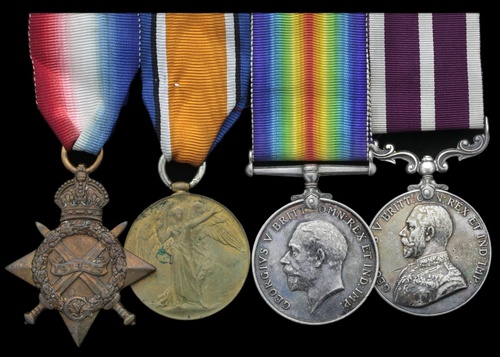
Auction: 22002 - Orders, Decorations and Medals
Lot: 221
A scarce Prisoner of War M.S.M. for Gallantry group of four awarded to Gunner E. Cooper, Royal Garrison Artillery, for his services after the Fall of Kut
1914-15 Star (35669. Gnr. E. Cooper. R.G.A.); British War and Victory Medals (35669 Gnr. E. Cooper. R.A.); Army Meritorious Service Medal, G.V.R. (35669 Gnr: E. Cooper. R.G.A.), mounted as worn, VM with replacement loop, contact marks, very fine (4)
M.S.M. London Gazette 29 August 1917. The award was duplicated in print in error on 30 January 1920 and the error rectified on 29 July 1921. His M.S.M. Card states:
'Mesopotamia. Gallantry, P. of. W. Turkey.'
Edward Cooper was born at Tottenham in 1889 and joined the Royal Garrison Artillery on 30 August 1911, serving in India from 28 October 1912-19 February 1915. He was thence posted to Mesopotamia with the 86th (Heavy) Battery, whose 5-inch guns had been recovered from the Rawalpindi Arsenal for service, despite having been consigned for scrap.
His unit served in the Siege of Kut-el-Amara which finally fell on 29 April 1916. Cooper went into the bag with some 2,592 British other ranks, around 70% of whom would lose their lives due to the brutal treatment at the hands of their captors. He was officially recorded as a Prisoner of War by the Ottoman Red Crescent on 24 October 1916, being held at several camps including Afion Kara-Hissar before being repatriated home via Salonika on 5 December 1918. He landed at Southampton on New Years' Day 1919. Unsurprisingly due to the nature of the conditions in which the captives were held, little documentary evidence remains as to the acts for which he earned his M.S.M. for Gallantry. It might be worth scanning the pages of Four-Fifty Miles to Freedom: The Adventures of Eight British Officers in their Escape from the Turks, written by Captain M. A. B. Johnson, R.G.A., and Captain K. D. Yearsley, R.E., for some possible examples of the type of work which Cooper might have been involved. Few of those held in such dreadful conditions could have wanted to sit on their laurels and perhaps Cooper played a role in assisting others to break free.
Either way, he was discharged on 6 June 1919 with various health issues - including malaria and neurasthenia - as a result of his privations.
Subject to 20% VAT on Buyer’s Premium. For more information please view Terms and Conditions for Buyers.
Sold for
£1,000
Starting price
£240




